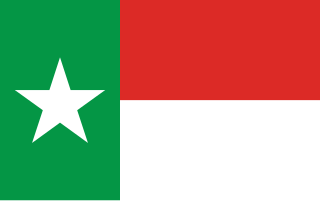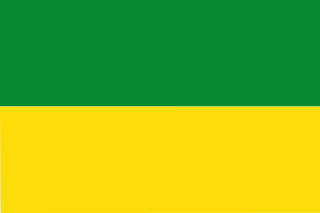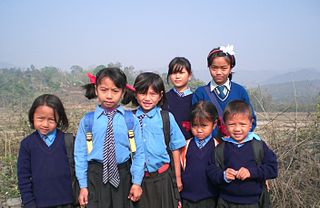
The United Liberation Front of Assam (ULFA) is an armed militant organisation operating in the Northeast Indian state of Assam. It seeks to establish an independent sovereign nation state of Assam for the indigenous Assamese people through an armed struggle in the Assam conflict. The Government of India banned the organisation in 1990 citing it as a terrorist organisation, while the United States Department of State lists it under "other groups of concern".

The National Liberation Front of Tripura is a banned Tripuri nationalist terrorist organisation based in Tripura, India. It has an estimated 550 to 850 members.

The Indigenous Nationalist Party of Twipra was a political party in the Indian state of Tripura. Bijoy Kumar Hrangkhawl was the President of the party. It merged with the Tipraha Indigenous Progressive Alliance (TIPRA) party on 11 June 2021.

Tribal Youth Federation is an organization affiliated to Democratic Youth Federation of India in Tripura. TYF organizes youth from the tribal populations of the state. TYF has a separate central committee and publishes Bini Kharad. The supreme body of TYF is the Central Conference.

The Insurgency in Northeast India involves multiple separatist militant groups operating in some of India's northeastern states, which are connected to the rest of India by the Siliguri Corridor, a strip of land as narrow as 14.29 miles (23.00 km) wide.

The Parbatya Chattagram Jana Samhati Samiti is a political party formed to represent the people and indigenous tribes of the Chittagong Hill Tracts in Bangladesh. Since its inception in 1972, the PCJSS has fought for autonomy and the recognition of the ethnic identity and rights of the indigenous tribes of the Hill Tracts. Its military arm, the Shanti Bahini was used to fight government forces and Bengali settlers in the Hill Tracts. A peace accord was signed in 1997 led to the disarmament of the Shanti Bahini and enabled the PCJSS to return to mainstream politics.

Bijoy Kumar Hrangkhawl is the current president of The Indigenous Progressive Regional Alliance or TIPRA. He was the leader of the Indigenous Nationalist Party of Twipra, a political party based in the Indian state of Tripura.

The Tripura Baptist Christian Union (TBCU) is a Baptist Christian denomination in Tripura, India. It has its head office in Agartala, the state capital. The TBCU is affiliated to the Asia Pacific Baptist Federation (APBF) and the Baptist World Alliance (BWA). It is also a member church in the North East India Christian Council (NEICC), a regional church body of the National Council of Churches in India (NCCI).

The Tripuri are a Tibeto-Burman-speaking ethnic group of Northeast Indian state of Tripura. They are the descendants of the inhabitants of the Twipra/Tripura Kingdom in North-East India and Bangladesh. The Tripuri people through the Manikya dynasty ruled the Kingdom of Tripura for ~450 years until the kingdom joined the Indian Union on 15 October 1949.

The Assam Accord was a Memorandum of Settlement (MoS) signed between representatives of the Government of India and the leaders of the Assam Movement. It was signed in the presence of the then-Prime Minister Rajiv Gandhi in New Delhi on 15 August 1985. Later, the Citizenship Act was amended for the first time the following year, in 1986. It followed a six-year agitation that started in 1979. Led by the All Assam Students’ Union (AASU), the protestors demanded the identification and deportation of all illegal foreigners – predominantly Bangladeshi immigrants. They feared that past and continuing large scale migration was overwhelming the native population, impacting their political rights, culture, language and land rights. The Assam Movement caused the estimated death of over 855 people. The movement ended with the signing of the Assam Accord.

The All Tripura Tiger Force (ATTF) was a Tripuri nationalist militant group active in India's Tripura State. It was founded on 11 July 1990, by a group of former Tripura National Volunteer members under the leadership of Ranjit Debbarma. The ATTF is considered a terrorist organisation by India. According to the South Asian Terrorism Portal, approximately 90% of the ATTF's administration are Hindu and the rest are Christians. The group was said to have been formed as the armed wing of the National Liberation Front of Tripura (NLFT) but split into its own organization. The group was headquartered in Tarabon in Bangladesh.
Tripuri Nationalism is an ideology that supports self-determination by the Tripuri people. The conflict is in essence ethnic and the Tripuri community, indigenous to the region formed the clear majority of population in the princely state of Tippera, which joined the Republic of India in 1949 as the state of Tripura.
Biswamohan Debbarma declared himself as a chairman of the National Liberation Front of Tripura of his own faction. In May 2017 in a meeting at an undisclosed location, selected Subir Debbarma alias Yamorok (45), as the new 'president' of the organization hence renamed NLFT SD which later signed a Memo of Settlement with Govt. of India on 10 August 2019. He is currently wanted by India and Interpol for crimes against life and health, and crimes involving the use of weapons/explosives.

The Indigenous Peoples Front of Tripura (IPFT) is a regional political party in Tripura, India. It is a member of the National Democratic Alliance and North-East Democratic Alliance. The party was merged into the Indigenous Nationalist Party of Tripura (INPT) in 2001, However diverged out in 2009. The party is allied with BJP in the 2018 Tripura Legislative Assembly election and won eight seats out of eight contested seats. The party got 7.5% of the total votes polled. The BJP got 36 seats and with a total of 44 seats the BJP-IPFT coalition have two-thirds majority at the Legislative Assembly.
Kamalnagar massacre refers to the murder of 14 unarmed Bengali Hindu villagers in Kamalnagar on 14 August 2003 by the All Tripura Tiger Force insurgents.
Operation Roukhala was an ethnic cleansing operation launched by the All Tripura Tiger Force (ATTF) for the eviction of Bengali Hindus from Tripura in the late 1990s and early 2000s. The word Roukhala in Kokborok literally means ouster or deportation or driving out. In the early stages of the movement, the ATTF and the National Liberation Front of Tripura (NLFT) separately issued quit notices to the Bengali Hindus. The ATTF named it as Operation Roukhala. Later NLFT joined the movement. According to the political leaders in Tripura, the rebels resort to abduction and murder of non-tribals in the Tripura Tribal Areas Autonomous District Council (TTAADC) area as a part of Operation Roukhala.
The Mizoram Peace Accord, 1986 was an official agreement between the Government of India and the Mizo National Front (MNF) to end insurgency and violence in Mizoram, India, that started in 1966. The Mizo National Front was an organisation of Mizo secessionists led by Laldenga to fight for independence from India. The movement was basically due to lack of support from the government during the great famine in Mizoram in the late 1950s. Political insurgency and social unrest ensued in the next decades. After a number of negotiations, the document titled Mizoram Accord, 1986: Memorandum of Settlement was finally signed on 30 June 1986. It was signed by Laldenga for MNF, R.D. Pradhan, Home Secretary, Government of India, and Lalkhama, Chief Secretary, Government of Mizoram. It is remarked as the most and only successful peace agreement in India after its independence from British Empire in 1947.

The insurgency in Tripura was an armed conflict which took place in the state of Tripura between India and several separatist rebel organisations. It was a part of the wider insurgency in Northeast India and was fueled by Tripuris.

The hill tribes of Northeast India are hill people, mostly classified as Scheduled Tribes (STs), who live in the Northeast India region. This region has the largest proportion of scheduled tribes in the country.
Bikram Bahadur Jamatia is a Tripuri Indian social worker and the former Akra (Head) of the Jamatia Hoda. He played an important role in promoting an indigenous people’s ‘movement’ against the NLFT, ATTF and other small terror group in Tripura. Jamatia received the Deendayal Upadhyaya National Integration Award Award and the Kalikinkar Debbarma Award for Excellent Performance in Classical Music in 2018. In 2023, he was awarded the Padma Shri (2023), the fourth-highest civilian award in India.













